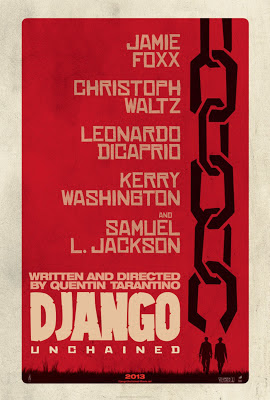Django Unchained
Dir: Quentin Tarantino
Starring: Jamie Foxx, Christoph Waltz,
Leonardo DiCaprio,
and Samuel L. Jackson
There are few filmmakers that are given the creative freedom
that Quentin Tarantino has when crafting a film. Whether it’s rewriting history
or reinventing genre standards, Tarantino has proven wholly capable of doing
just about anything he wants. With Django
Unchained, Tarantino has made a Blaxploitation, spaghetti western, focused
around the element of slavery. The scope of this film, though not as immense as
his masterpiece Inglorious Basterds, is
still considerable as Tarantino lavishes his distinctive style into every
fascinating frame of Django Unchained.
The film begins in the darkness of a Texas brush, the
clacking of chains echoes through the night. Dr. King Shultz (Christoph Waltz),
a dentist turned bounty hunter, is looking to purchase a specific slave by the
name of Django (Jamie Foxx). When met with opposition from the slave owners,
Shultz proves far more dangerous than his unintimidating stature might reveal.
Shultz is in search of a bounty and enlists Django to assist him in promise of
helping him find his enslaved wife. Django’s wife Broomhilda (Kerry Washington)
is in the confines of Candieland, a plantation owned by the loathsome Calvin
Candie (Leonardo DiCaprio). Shultz
trains Django as a bounty hunter, offering him the tools he’ll need to navigate
his vengeance.
The elements of genre, and there are numerous ones at play
here, are woven and exemplified as much, if not more, than other Tarantino
offerings. The film transitions from genre to genre quit often. At times it
makes the narrative feel uneven due largely to the establishment of tone, but
oddly enough it’s also successfully executed. In one scene of genre melding a convoy
of horses and carriages is accompanied by a hip-hop soundtrack that fits
perfectly with the scene. Tarantino walks the line of exploitation and
examination when analyzing the issue of slavery, however the employment of
comedy and romance break up the trappings to an extent. The handling of violence on the other hand is
plentiful and thoroughly vicious.
Part of what makes these stories work for Tarantino is the
near perfect casting of his characters; and thus is the same with Django Unchained. Jamie Foxx, although
overshadowed, seems tailored to play the role of a vengeful cowboy. There is a
swagger and attitude he brings to Django that offer the strongest attributes,
however he doesn’t seem to register beyond the one-liners. Tarantino implements
story elements that force Django to play numerous characters in order to
capture bounties. This leaves little for Foxx to build upon when he is tasked
with carrying the film. Leonardo DiCaprio is captivating as Calvin Candie
bringing gleeful animosity as a plantation owner that deals in brutal slave
fighting. Christoph Waltz is again impressive playing opposite of his persona
in Inglorious Basterds. Waltz
displays a confidence through his soft-spoken delivery that sparks the
Tarantino driven monologues.
And then there’s Samuel L. Jackson’s layered character
Stephen, the head house servant in Candieland. Jackson is great, harboring despise
for Django’s freedom while also levying an Uncle Tom mentality tinged with
deceit and hatred for everyone but himself, it’s a tough character to embody in
a film that is already peaked with a narrative revolving around hate.
Whether it’s the examination of the racial relationships of
Django and Shultz or Candie and Stephen, or his proclivity for picturing
history through his own eye, Tarantino’s analysis on race and the still
lingering effects on history seen in daily life or media rendering offers
observant insight into a filmmaker operating for something more than just
entertainment. As his past catalog has proven, Django Unchained included, Tarantino’s films are perceptive and
captivating. Time will tell but Tarantino may one day harbor a genre of his own
definition.
Monte’s Rating




No comments:
Post a Comment